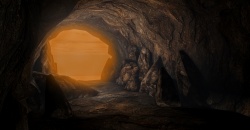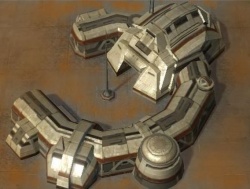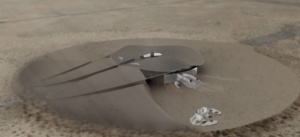Geography
Common misconception is that the surface of Krayiss II is a desert wasteland, when in actuality it is both arid and mountainous. The mountains form an effect called a rain shadow, where incoming air is pulled upwards by strong winds toward the top of mountains, where it condenses and precipitates, meaning that cold and moisture stay on one side of the mountain and only very warm and dry air passes over the mountain. This creates a shadow or stretch of only warm and dry land over the other side of the mountain with far too little rain to support the growth of most plants or animals.
In the case of Krayiss II, this rain shadow effect is lessened further by the lack of moisture present. What little exists is constantly pulled up into the atmosphere, sustaining it but leaving the ground incredibly dry. The hard packed dirt grows only tough shrubs and thick grass and even that is scarce. As such, agriculture is non-existent, and supplies need to be brought in from off-world, or the nearby sister planet Krayiss III.
Underneath the planet’s crust lies a mine of resources, consisting of large water aquifers and substantial mineral deposits. The Ancient Sith Empire had found the mineral reserves, but concentrated more on the building of the Temple-Library and maintaining other, more plentiful mineral reserves on other planets within their occupation. Only two mining attempts were made by the Empire, both of which perished due to sandstorms on the planet’s surface which damaged their equipment beyond repair. Future attempts at mining the deposits by other sources also succumbed to the wild storms.
Moons
History
Ancient Sith Empire
Landmarks
Temple Library & Obelisk
Krayiss II’s Sith Temple is designed in much the same style as those upon the other Sith homeworlds. The temple is a large structure, designed with steep, angled walls and numerous pyramidal towers as well as a single large ornate doorway. It is made of mostly obsidian, giving it a dark lustre as well as a powerful Dark Side presence.
Most of the temple is dominated by the massive library, rivalling even that of Korriban. Rows upon rows of tomes were stored and hoarded upon the shelves by the Ancient Sith, records of the Empire and of lost arts of the Dark Side. At its completion, the Library of Krayiss II was one of the marvels of the Ancient Sith Empire, and drew almost every Lord of the era to its halls at one point or another.
At the top of the temple is an ornate obelisk which served in the past as an apex. The obelisk also houses a secret entrance, designed as a fallback lest the main doorway become compromised and the safety of the secrets within be nullified. Many years after the Ancient Sith Empire fell, the Temple was covered by the sands of the planet, leaving the Obelisk as the only entrance. It is still fiercely and loyally guarded by the spirits of the dead, the most well known of which being a deceased Jedi Master named Jev Sunrider.
Cave of Jev Sunrider

High Value Targets
One Sith Occupation and Structures
One Sith Base Camp
 One Sith Base: MilBar F-221
One Sith Base: MilBar F-221
The origins of the One Sith base camp can be traced to a hasty defense established out of necessity during the initial occupation. Blistering sand storms and harsh temperatures forced the One Sith Expedition to seek refuge to facilitate survival. Initial construction utilized the rocky mountainous terrain for both concealment and cover. In addition, they were able to capitalize on the inherent advantage elevation afforded them to bolster security. The Sith explorers were careful to avoid natural lines of drift that would potentially lead planetary transients to their location.
At the outset, living conditions were austere at best and comprised of rudimentary living conditions and security. Dimensions of this base were not recorded as it was dictated by terrain and subsequently nearly impossible to measure. A basic security perimeter was strategically established within the adjacent rocky outcrops. Four perimeter outposts were created, spread out as equidistant as the terrain would allow, to optimized line of sight in all cardinal directions. Living conditions consisted of co-inhabited tents located under naturally occurring rock formations within the perimeter.
Fortifications and quality of life have increased exponentially as a result of the establishment of a small star port located in close proximity. This port offers inhabitants of the planet routine resupply. The four security outpost have been equipped with automated blast-turrets, giving those on watch a significant upgrade to their lethality and respective fields of fire. Additionally, stone walls were erected around the position to augment survivability. Similarly, fifteen foot rock walls were built around the perimeter of the base camp.
Perhaps the most notable change to overall quality of life came in the form of a MilBar F-221 . The comfort, privacy, and protection provided the necessary solace to the One Sith Explorers after an exhausting day of exploration. In addition, one room within is reserved as a tactical operation center which increases the Sith Lord’s ability to execute mission command authority over his expeditionary team. Unique to this establishment is a Listening Post located in the center of the camp and equipped with highly specialized listening and communication devices. This structure serves as both an early warning device and a hub to intercept strategic communications. A series of fortified bunkers and tunnels connect the One Sith Base to the Star Port. This serves as not only a conduit between the two locations but more importantly a covert passageway in the event one should be overrun.
Necessary improvements are ongoing as exploration efforts throughout the planet increase. A related surge in personnel and equipment will undoubtedly force the One Sith Base Camp’s footprint to expand in the coming days.
One Sith Star Port
 One Sith Star Port
One Sith Star Port
At first glance the Star Port looks rather unassuming; a large circular landing pad that was constructed over a crater that had been left in the planet's surface. The once abandoned Port maintains a theme of smooth and rounded edges in its architecture. It was designed to blend with the surrounding terrain, but to stand out enough so that ships could find it without much trouble-- if they knew where they were looking.
The hangar entrance sits at ground level, and is housed under a disk-like roof very similar to the landing platform around it. The hangar was designed to handle nothing larger than Freighter class, as there was little Capital-class ships that bothered with the ancient world. While this is the only visible entrance for ships, there is a secured heavy-duty blastdoor next to it that allows entrance in the event of the hangar being locked down. The true depth of the Space Port, though, lies in what was buried beneath the surface. The platform inside is actually a giant elevator powered by repulsor lifts. Underneath the surface hangar is a much larger facility that can store additional ships.
The Space Port itself consists of an entrance lobby that gives way to a lounge. Outdated holo-transmitters line the walls, with newer consoles erected next to them. Circular booths with tables in the center showed use by the recent occupiers, but a large portion of them remain untouched. A series of shops that used to make up the market place has multiple store fronts closed boarded up. Branching out from the lounge,there was also a suite of formal conference rooms, an abandoned armory stripped of anything of value, and a small barracks complete with mess hall that has been restored for use. There is also an engineering room for the security droids that had patrolled the once bustling port. The docks for the security droids lays untouched in the time since this place has been abandoned. Though some of the hulking droids can be found stationed here once more, it is still uncertain if they are operational as they have lain dormant for so long.
While the space port itself is impressive enough, the final part that is unseen, even unknown to most, is the elaborate network of tunnels that shoot off from the building itself. These tunnels were used more as an escape route away from the Space Port as well as a quick entrance inside. These were used mainly for maintenance most of the time, hence why not many people have the knowledge of these tunnels.
First to Wake, Last to Die
In 36ABY, members of the Dark Jedi Brotherhood were deployed to investigate One Sith’s actions, and tasked with scouting the ancient planet. Clan Arcona was first to touch down, lead by Proconsul Marick Arconae. Team 'Pwncona' was broken into two teams. Marick headed up Team "Duh", consisting of veterans Legorii Kryotek Entar, Kratus Vahillus, Cethgus Entar,xK'tana, and the recently-knighted xIncendus.
Quaestor Socorra Erinos along with her Aedile Valhavoc made up Team "Winning". With them was Dark Jedi Master xTroutrooper, Gatewarden xTsainetomo Keibatsu, and recently-knighted Montresor and xFet'ai'narun. The team rounded off with veteran Etah d'Tana.